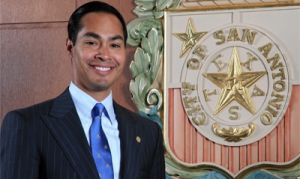
Does San Antonio have the resources to create a powerful Latino middle class similar to the black middle class that exists in Atlanta, Georgia? It’s a good question, one that San Antonio Mayor Julián Castro has asked himself, and hopes to have the answer to.
“I do think that San Antonio can become, just because of its history, its demographics, a lot like Atlanta, in terms of the large segment of African American professionals and a very successful middle class,” he told us in an interview earlier this year. “Whether its in the tech field or the legal field or in advertising, whatever is is, we can have that here.”
To back up his position, Castro cited several facts and examples. He pointed to Miami, mentioning that this middle class exists there, to a certain extent. He said that, while San Antonio is 63% Hispanic, the city of 1.3 million has industries such as new energy, cybersecurity, aerospace, bio-science and healthcare to allow these people to seek the types of jobs that will create that strong Latino middle class.
“Latinos have to be a part of that equation,” Castro said.
Of course, there are plenty of obstacles to this goal in our current world.
During the most recent recession, both Latinos and African Americans lost more wealth than whites, they lost jobs and their homes at higher rates, too. Educational attainment, from the high school to graduate levels, also leaves a lot to be desired. Given all of this, in his own city, Castro is working in basic ways towards this goal.
To begin with, in his capacity as mayor, Castro said his administration is looking at small business incentives and contracting ordinances to incentivize bigger companies to work with smaller businesses. The idea is to spur 21st century entrepreneurialism in San Antonio, he said. In this city, entrepreneurialism has centered on 20th century industries — such as real estate, oil, gas, hospitality, the military — whereas just 70 miles up the road in Austin, startups and newer industries have thrived, he explained.
Whether or not Castro will be able to transform San Antonio’s economy during his tenure as mayor has yet to be seen, but at least he’s trying. As Austin’s Latino population continues to grow, currently at 35%, perhaps Latinos there will be able to jump on the tech bandwagon that continues to develop in that part of the country.
Whatever the case, the future of Texas’ economies, as well as those everywhere else, are intimately tied to whether or not Latinos are involved in technology and business moving forward.
[Image via SanAntonio.gov]






2 Trackbacks
[…] — who we interviewed and actually fully understands the need for more Latinos in tech and is working towards a solution in his hometown — plays […]
[…] — who we interviewed and actually fully understands the need for more Latinos in tech and is working towards a solution in his hometown — plays […]